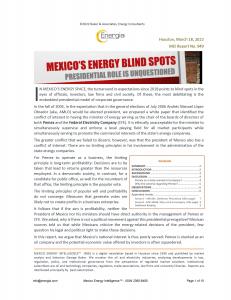Mexico’s President Should Decouple from Pemex and CFE: George Baker
Mexico’s national interest is harmed by presidential involvement in executive appointments and strategy
The report, issued by Mexico Energy Intelligence™ (MEI 949 - Extracts), an oil industry newsletter, discerns an irreconcilable conflict of interest in the limiting principles of a politician and business executive. The executive is limited by the requirement of long-term profitability, verifiable by accountants and rated by credit agencies.
The politician, in contrast, is limited by votes, poll numbers, and the scope of formal and informal authority. The politician is free to introduce into the national conversation non-verifiable notions like climate crisis, just price and energy sovereignty. The last-mentioned is promoted by Mexico’s president, Andrés Manuel López Obrador, as having a meaning beyond the conventional understanding of energy security, which encompasses domestic production, reserves and trade.
The authors discern that when a politician or military leader makes single-handed decisions about executive appointments and business strategy in a state-owned company, losses are likely to follow. In Saudi Arabia’s national oil company, an international board of directors sets some limits on the Crown’s authority. In Mexico, in contrast, Pemex’s board members are Mexican presidential appointees and cannot establish or enforce limits to the president’s involvement.
In Mexico, this worldwide pattern is seen in the financial statements of Mexico’s state’s oil and power companies, whose chief executive by law is appointed and fired by the president of Mexico. During 2012-18, there were three consecutive directors-general of Petróleos Mexicanos (Pemex).
On the oil side, Pemex has not made a profit in two decades and reports debt as upwards of US$110 billion (https://www.sec.gov/edgar/browse/?CIK=0000932782). On the power side, the **Federal Electricity Company** (CFE) has never made a profit owing to diverse, government-mandated subsidies.
The authors of the report propose that a second national oil company be created in the fashion of other companies such as Equinor and Petrobras. The company would be majority state-owned but under professional management by an international board that would appoint the chief executive. Only in this new regime could the president of Mexico disengage from the micromanagement of the companies.
An example of presidential micromanagement is seen in his meeting on March 31st with John Kerry and American business executives. President López noted that no U.S. oil company was investing in Mexico, despite holding valid contracts. He urged Talos, whose president, Tim Duncan, was in the room, to continue to invest in Mexico with its money or that of other companies or a hedge fund, offering speedy approvals by the National Hydrocarbon Commission (CNH).
The authors identify two obstacles to a regulatory regime change: The first is Cardenismo, the time-honored, populist belief since 1938 that Mexico has a national oil vocation that requires that the president should be at the center of the Pemex news cycle. "Cardenismo is Mexico's civil religion," observes George Baker.
The second obstacle is yet more challenging: The Mexican public is so accustomed to presidential involvement in the administration of the state energy companies that the inherent damage to the national interest from this arrangement goes unnoticed.
Critics have focused on the president’s decisions regarding the construction of a new refinery in his home state of Tabasco and the purchase of another refinery in Texas. Still, they have not questioned in public the legal arrangement by which the president has the authority, formal and informal, to make such decisions.
The report speculates that the political-industrial complex in Mexico will continue to support presidential discretion in the energy sector. It concludes that investors during the period 2015-18 were premature in seeking opportunities with the president of Mexico looking askance in the middle of the road.
George Baker
Mexico Energy Intelligence
+1 832-434-3928
email us here
Visit us on social media:
Twitter
Other
AMLO press conference, April 1st. Comments on the 5-hour meeting with John Kerry, Tim Duncan and others on March 31st begin at Hour 1:02.
Legal Disclaimer:
EIN Presswire provides this news content "as is" without warranty of any kind. We do not accept any responsibility or liability for the accuracy, content, images, videos, licenses, completeness, legality, or reliability of the information contained in this article. If you have any complaints or copyright issues related to this article, kindly contact the author above.


